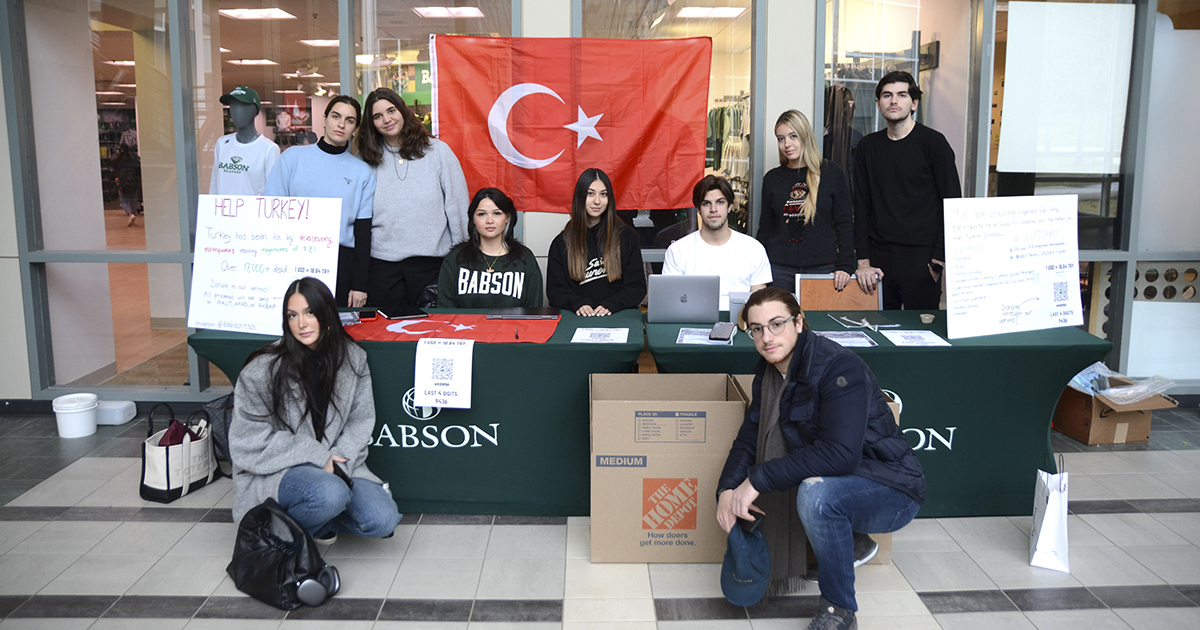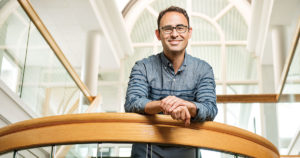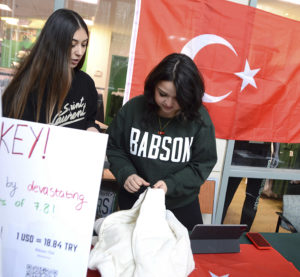Babson’s Turkish Community Unites After Earthquakes Shatter Country

Amid the devastation of Gaziantep, Turkey—one of the cities hit by last week’s 7.8 magnitude earthquake—it was an image of crumbling Gaziantep Castle that shook Enes Karakullukcu ’25 and punctuated the scale of the disaster.
“That castle’s been there since before the Byzantine Empire, hundreds and thousands of years, and it’s wiped out,” the Babson College sophomore said. “Just gone.”
Karakullukcu is one of many Turkish students and other community members at Babson who have watched recovery efforts from thousands of miles away, rattled yet resolved to help their country rebuild in the shaky aftermath of the quake and aftershocks.
He sat in Donald W. Reynolds Campus Center last Sunday, surrounded by bags stuffed with blankets, coats, and sleeping bags donated by the Babson community.
“We raised $8,000 in one day,” Karakullukcu said of Babson’s Turkish students, the 10th-largest representation of any country at the College “I was really happy to see that pretty much all of Babson’s students from Turkey were able to contribute.”
The quakes are the worst natural disaster to hit the region in a century. More than 41,000 people have died since the 7.8 and 7.5 magnitude earthquakes struck southeastern Turkey and northern Syria in the early hours of Feb. 6. Across the 10 cities impacted, millions of Turkish families remain homeless, hungry, and freezing, ousted from their destroyed homes while frantically searching for family members during the frigid winter season.
“I’m heartbroken. This is the most catastrophic event that’s hit my country for a long time, at least since it became a republic,” Karakullukcu said, referencing the proclamation of the Republic of Turkey in 1923. “It’s huge, and it has been a shock. A big shock.”
Taking Comfort, Taking Pride
Karakullukcu got news of the first earthquake as he was eating dinner Sunday night, and he reached out to family and fellow Turkish students at Babson almost immediately.
Sensing the deep alarm and desire to help, Karakullukcu worked with friends to set up an Instagram account to funnel donations to the right organizations, such as AKUT, a non-governmental association of expert volunteers whose mission is to search and rescue disaster victims. They then moved to create the Babson Turkish Student Association to provide unity and comfort during the ongoing disaster.

“I have to give kudos to our Turkish students. They really rose to the occasion,” said Sinan Erzurumlu, Babson professor of innovation and operations management who is also from Turkey. Erzurumlu has donated to national and international emergency response organizations, but he appreciates being able to assist Babson’s Turkish students. “I think it’s different when you come together with fellow citizens. You start taking action and encouraging each other, and seeing that really gives me pride.”
Many members of Babson’s Turkish community and their families live far away from the quake’s epicenter, leaving them physically unharmed despite the ongoing aftershocks. But the scope of the disaster means almost everyone will be impacted, Erzurumlu said.
“I don’t think that there is a single Turkish person who will not be affected, who will not have someone or know someone who is connected to the area,” he said.
Any Small Step Helps
Despite the frustration of trying to help their homeland from thousands of miles away, both Erzurumlu and Karakullukcu see an upside.
“You could be very upset about it and keep it to yourself, or you can ask, ‘What can I do?’ And I think any small, simple step helps,” Erzurumlu said. He has been exchanging daily texts with two acquaintances whom he hasn’t spoken to in years, checking in with them to see if he can help. “I just want them to know they can reach out to me, if not today, then maybe in the coming months. It makes me feel better, personally, and it’s a small thing, but it’s helpful.”

The fundraising spearheaded by the Babson Turkish Student Association is another advantage, Karakullukcu said.
“There’s a huge difference between the Turkish lira and the dollar, and university students in America have been able to raise a lot,” Karakullukcu said. Donations from Babson community members surpassed $16,000 as of Wednesday. “That money can have a huge impact, and we wouldn’t be able to raise this much if we were in Turkey, so I’m really happy we’re able to do that,” he added.
Citizen volunteers in Turkey are being asked to stay home, as recovery experts work through precarious piles of concrete and rebar to clear the debris and look for survivors. While rescue has become more unlikely, two women were saved nine days after the quake struck in the Turkish town of Kahramanmaras.
Members of the Babson Turkish Student Association spent Sunday cramming bagfuls of donations into Karakullukcu’s car, bound for the office of the Turkish Consulate in Boston. But both Karakullukcu and Erzurumlu urged the Babson community to stay engaged, and continue donations as Turkey’s long recovery process continues.
“Obviously, recovery is going to last for a long time. Entire cities need to be rebuilt, families are devastated, and it’s going to take years,” Karakullukcu said. “But it’s good to see the world helping us.”
Where to Donate
The Babson Turkish Student Association has asked that further donations toward the recovery efforts in Turkey be made to these organizations:
- AFAD: Turkey’s official disaster and emergency management authority.
- AKUT: Voluntary, non-governmental organization involved in searching, assisting, and rescuing the victims of the earthquake.
- AHBAP: With 30,000 volunteers on board, the AHBAP is another local voluntary network that is currently active in the affected regions.
Posted in Community




